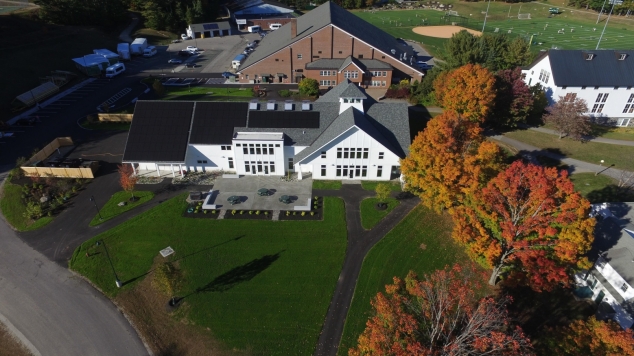
Proctor Academy opened the doors to a net-zero ready dining facility, Brown Dining Commons, this fall. The building is the first of its kind in New England and serves three meals a day to Proctor’s 370 students and 150 faculty and staff. The boarding and day school located in Andover has long demonstrated an institutional commitment to environmental stewardship, installing a biomass heating plant in 2008 and more than 360 kwh of solar panels on campus over the past twelve months. When it was time to design and plan a new dining facility due to insufficient space in the old Cannon Dining Hall, Proctor’s Board of Trustees and Administration set out to build the most environmentally friendly dining facility at an independent school in New England. Just over a year after construction began, that vision has become a reality thanks to the generous contributions of many donors. The building’s name honors The Brown Foundation, Inc. of Houston, Texas leadership commitment to the project and longtime friendship to Proctor.
Proctor’s commitment to making the 16,100 square foot facility net-zero ready increased the price tag for the new facility to over $7.8 M. The school and its donors believe the long-term investment in environmentally friendly construction is the best type of investment the school can make. Proctor’s Head of School Mike Henriques notes, “The Dining Commons reflects the school’s commitment to its environmental mission and its aspirations for a greener future. We believe Proctor plays a role in modeling sustainability for our community while raising the bar regionally. We like that. We also love being able to give to our talented kitchen staff the means to create for our community. We now share meals in a warm and welcoming space that we have been dreaming about since 1977 when Cary House was lost to fire. This facility has already proven to be a spectacular addition to the Proctor campus.”
The building includes the following environmental features:
- 40 Geothermal wells to provide heating/cooling year-round
- 48 kWH of rooftop solar capacity and special design to maximize natural light, while minimizing solar heat gain.
- Rain garden collection system collecting to reduce waste water entering campus drainage system by collecting 56,000 gallons of water for each 2 year, 24 hour storm event.
- LED lights installed throughout the building, reducing energy costs by a minimum of 10% each year.
- Constructed using only low and zero-VOC emitting materials including paint, adhesives, sealants, and thermal insulation.
- Conversion of all electrical kitchen equipment (with the exception of the pizza oven) eliminating fossil fuel consumption (Proctor purchases all electrical energy from renewable energy sources)
- Internal separate metering capability will be installed to monitor energy consumption for the facility
Maclay Architects, an architectural firm out of Waitsfield, Vermont known for its innovative buildings merging sustainability and aesthetics, designed the Brown Dining Commons on Proctor’s campus. Bill Maclay, whose son Thayer graduated from Proctor in 2008, comments, “Proctor has completed a new Dining Commons which will quickly become a core social hub on the campus, as well as a model of environmental sustainability including net zero energy performance.Taking on the challenge of building a net zero dining hall is no small feat. Dining facilities have large process loads due to cooking, dish washing, mechanical and fire suppression requirements, making net zero difficult to achieve. Proctor’s vision and strong commitment to mission guided our process in tackling this exciting challenge to make it a reality. We are proud and excited to have been a part of this ambitious and inspiring project.”
Proctor’s Environmental Coordinator, Alan McIntyre adds, “Our new dining commons is yet another example of our effort to honor our environmental mission to lower our carbon footprint. Geothermal heating and cooling, Photovoltaic solar arrays, electric kitchen and LED lights represent our deliberate transition away from fossil fuel dependent buildings. Furthermore it showcases how Proctor can demonstrate and solve problems in a time of unpredictable climate change.”
Mike Hulbert, Vice President and Project Manager for HP Cummings Construction Company, adds, “We’ve really appreciated the staff and students at Proctor Academy and their patience with the construction activities throughout the past year. We’d like to say an especially huge thank you to the kitchen staff! Their ability to work with us and learn to cook with their new equipment in such a quick time frame helped tremendously! Thank you so much for the opportunity to be a part of this project!” Mike Hulbert VP, Project Manager.
Chair of Proctor Academy’s Board of Trustees Tom Healey notes, “Proctor’s commitment to environmental sustainability and to the residential life experience of our students is epitomized in the construction of the Brown Dining Commons. Students, faculty, and staff will share three meals a day in this building, and each time they gather, the design and details of this amazing building will remind everyone of our shared responsibility to be great stewards of our environment. Proctor has an amazing culture and this building will help sustain it for multiple generations.”